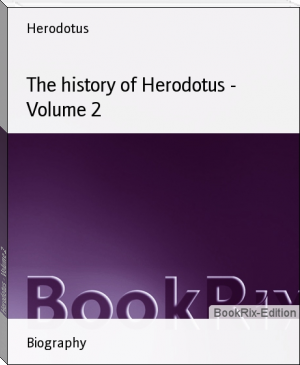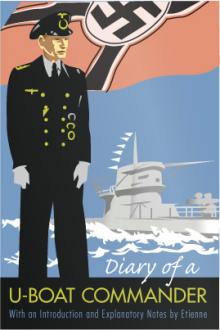The history of Herodotus - Volume 2 - Herodotus (manga ereader txt) 📗

- Author: Herodotus
Book online «The history of Herodotus - Volume 2 - Herodotus (manga ereader txt) 📗». Author Herodotus
Miltiades and said as follows: "With thee now it rests, Callimachos, either to bring Athens under slavery, or by making her free to leave behind thee for all the time that men shall live a memorial such as not even Harmodios and Aristogeiton have left. For now the Athenians have come to a danger the greatest to which they have ever come since they were a people; and on the one hand, if they submit to the Medes, it is determined what they shall suffer, being delivered over to Hippias, while on the other hand, if this city shall gain the victory, it may become the first of the cities of Hellas. How this may happen and how it comes to thee of all men[99] to have the decision of these matters, I am now about to tell. Of us the generals, who are ten in number, the opinions are divided, the one party urging that we fight a battle and the others that we do not fight. Now if we do not, I expect that some great spirit of discord will fall upon the minds of the Athenians and so shake them that they shall go over to the Medes; but if we fight a battle before any unsoundness appear in any part of the Athenian people, then we are able to gain the victory in the fight, if the gods grant equal conditions. These things then all belong to thee and depend on thee; for if thou attach thyself to my opinions, thou hast both a fatherland which is free and a native city which shall be the first among the cities of Hellas; but if thou choose the opinion of those who are earnest against fighting, thou shalt have the opposite of those good things of which I told thee." 110. Thus speaking Miltiades gained Callimachos to his side; and the opinion of the polemarch being added, it was thus determined to fight a battle. After this, those generals whose opinion was in favour of fighting, as the turn of each one of them to command for the day[100] came round, gave over their command to Miltiades; and he, accepting it, would not however yet bring about a battle, until his own turn to command had come. 111. And when it came round to him, then the Athenians were drawn up for battle in the order which here follows:- On the right wing the polemarch Callimachos was leader (for the custom of the Athenians then was this, that the polemarch should have the right wing); and he leading, next after him came the tribes in order as they were numbered one after another, and last were drawn up the Plataians occupying the left wing: for[101] ever since this battle, when the Athenians offer sacrifices in the solemn assemblies[102] which are made at the four-yearly festivals,[103] the herald of the Athenians prays thus, "that blessings[104] may come to the Athenians and to the Plataians both." On this occasion however, when the Athenians were being drawn up at Marathon something of this kind was done:-their army being made equal in length of front to that of the Medes, came to drawn up in the middle with a depth of but few ranks, and here their army was weakest, while each wing was strengthened with numbers. 112. And when they had been arranged in their places and the sacrifices proved favourable, then the Athenians were let go, and they set forth at a run to attack the Barbarians. Now the space between the armies was not less than eight furlongs:[105] and the Persians seeing them advancing to the attack at a run, made preparations to receive them; and in their minds they charged the Athenians with madness which must be fatal, seeing that they were few and yet were pressing forwards at a run, having neither cavalry nor archers.[106] Such was the thought of the Barbarians; but the Athenians when all in a body they had joined in combat with the Barbarians, fought in a memorable fashion: for they were the first of all the Hellenes about whom we know who went to attack the enemy at a run, and they were the first also who endured to face the Median garments and the men who wore them, whereas up to this time the very name of the Medes was to the Hellenes a terror to hear. 113. Now while they fought in Marathon, much time passed by; and in the centre of the army, where the Persians themselves and the Sacans were drawn up, the Barbarians were winning, -here, I say, the Barbarians had broken the ranks of their opponents and were pursuing them inland, but on both wings the Athenians and the Plataians severally were winning the victory; and being victorious they left that part of the Barbarians which had been routed to fly without molestation, and bringing together the two wings they fought with those who had broken their centre, and the Athenians were victorious. So they followed after the Persians as they fled, slaughtering them, until they came to the sea; and then they called for fire and began to take hold of the ships. 114. In this part of the work was slain the polemarch Callimachos after having proved himself a good man, and also one of the generals, Stesilaos the son of Thrasylaos, was killed; and besides this Kynegeiros the son of Euphorion while taking hold[107] there of the ornament at the stern of a ship had his hand cut off with an axe and fell; and many others also of the Athenians who were men of note were killed. 115. Seven of the ships the Athenians got possession of in this manner, but with the rest the Barbarians pushed off from land, and after taking the captives from Eretria off the island where they had left them, they sailed round Sunion, purposing to arrive at the city before the Athenians. And an accusation became current among the Athenians to the effect that they formed this design by contrivance of the Alcmaionidai; for these, it was said, having concerted matters with the Persians, displayed to them a shield when they had now embarked in their ships. 116. These then, I say, were sailing round Sunion; and meanwhile the Athenians came to the rescue back to the city as speedily as they could, and they arrived there before the Barbarians came; and having arrived from the temple of Heracles at Marathon they encamped at another temple of Heracles, namely that which is in Kynosarges. The Barbarians however came and lay with their ships in the sea which is off Phaleron, (for this was then the seaport of the Athenians), they anchored their ships, I say, off this place, and then proceeded to sail back to Asia.
117. In this fight at Marathon there were slain of the Barbarians about six thousand four hundred men, and of the Athenians a hundred and ninety and two. Such was the number which fell on both sides; and it happened also that a marvel occurred there of this kind:-an Athenian, Epizelos the son of Cuphagoras, while fighting in the close combat and proving himself a good man, was deprived of the sight of his eyes, neither having received a blow in any part of his body nor having been hit with a missile, and for the rest of his life from this time he continued to be blind: and I was informed that he used to tell about that which had happened to him a tale of this kind, namely that it seemed to him that a tall man in full armour stood against him, whose beard overshadowed his whole shield; and this apparition passed him by, but killed his comrade who stood next to him. Thus, as I was informed, Epizelos told the tale.
118. Datis, however, as he was going with his army to Asia, when he had come to Myconos saw a vision in his sleep; and of what nature the vision was it is not reported, but as soon as day dawned he caused a search to be made of the ships, and finding in a Phenician ship an image of Apollo overlaid with gold, he inquired from whence it had been carried off. Then having been informed from what temple it came, he sailed in his own ship to Delos: and finding that the Delians had returned then to the island, he deposited the image in the temple and charged the men of Delos to convey it back to Delion in the territory of the Thebans, which is situated by the sea-coast just opposite Chalkis. Datis having given this charge sailed away: the Delians however did not convey the statue back, but after an interval of twenty years the Thebans themselves brought it to Delion by reason of an oracle. 119. Now as to those Eretrians who had been reduced to slavery, Datis and Artaphrenes, when they reached Asia in their voyage, brought them up to Susa; and king Dareios, though he had great anger against the Eretrians before they were made captive, because the Eretrians had done wrong to him unprovoked, yet when he saw that they had been brought up to him and were in his power, he did them no more evil, but established them as settlers in the Kissian land upon one of his own domains, of which the name is Ardericca: and this is distant two hundred and ten furlongs from Susa and forty from the well which produces things of three different kinds; for they draw from it asphalt, salt and oil, in the manner which here follows:-the liquid is drawn with a swipe, to which there is fastened half a skin instead of a bucket, and a man strikes this down into it and draws up, and then pours it into a cistern, from which it runs through into another vessel, taking three separate ways. The asphalt and the salt become solid at once, and the oil[108] which is called by the Persians /rhadinake/, is black and gives out a disagreeable smell. Here king Dareios established the Eretrians as settlers; and even to my time they continued to occupy this land, keeping still their former language. Thus it happened with regard to the Eretrians.
120. Of the Lacedemonians there came to Athens two thousand after the full moon, making great haste to be in time, so that they arrived in Attica on the third day after leaving Sparta: and though they had come too late for the battle, yet they desired to behold the Medes; and accordingly they went out to Marathon and looked at the bodies of the slain: then afterwards they departed home, commending the Athenians and the work which they had done.
121. Now it is a cause of wonder to me, and I do not accept the report, that the Alcmaionidai could ever have displayed to the Persians a shield by a previous understanding, with the desire that the Athenians should be under the Barbarians and under Hippias; seeing that they are evidently proved to have been haters of despots as much or more than Callias the son of Phainippos and father of Hipponicos, while Callias for his part was the only man of all the Athenians who dared, when Peisistratos was driven out of Athens, to buy his goods offered for sale by the State, and in other ways also he contrived against him everything that was most hostile: [122. Of this Callias it is fitting that every one should have remembrance for many reasons: first because of that which has been before said, namely that he was a man of excellence in freeing his country; and then also for that which he did at the Olympic games, wherein he gained a victory in the horse- race and was second in the chariot-race, and he had before this
117. In this fight at Marathon there were slain of the Barbarians about six thousand four hundred men, and of the Athenians a hundred and ninety and two. Such was the number which fell on both sides; and it happened also that a marvel occurred there of this kind:-an Athenian, Epizelos the son of Cuphagoras, while fighting in the close combat and proving himself a good man, was deprived of the sight of his eyes, neither having received a blow in any part of his body nor having been hit with a missile, and for the rest of his life from this time he continued to be blind: and I was informed that he used to tell about that which had happened to him a tale of this kind, namely that it seemed to him that a tall man in full armour stood against him, whose beard overshadowed his whole shield; and this apparition passed him by, but killed his comrade who stood next to him. Thus, as I was informed, Epizelos told the tale.
118. Datis, however, as he was going with his army to Asia, when he had come to Myconos saw a vision in his sleep; and of what nature the vision was it is not reported, but as soon as day dawned he caused a search to be made of the ships, and finding in a Phenician ship an image of Apollo overlaid with gold, he inquired from whence it had been carried off. Then having been informed from what temple it came, he sailed in his own ship to Delos: and finding that the Delians had returned then to the island, he deposited the image in the temple and charged the men of Delos to convey it back to Delion in the territory of the Thebans, which is situated by the sea-coast just opposite Chalkis. Datis having given this charge sailed away: the Delians however did not convey the statue back, but after an interval of twenty years the Thebans themselves brought it to Delion by reason of an oracle. 119. Now as to those Eretrians who had been reduced to slavery, Datis and Artaphrenes, when they reached Asia in their voyage, brought them up to Susa; and king Dareios, though he had great anger against the Eretrians before they were made captive, because the Eretrians had done wrong to him unprovoked, yet when he saw that they had been brought up to him and were in his power, he did them no more evil, but established them as settlers in the Kissian land upon one of his own domains, of which the name is Ardericca: and this is distant two hundred and ten furlongs from Susa and forty from the well which produces things of three different kinds; for they draw from it asphalt, salt and oil, in the manner which here follows:-the liquid is drawn with a swipe, to which there is fastened half a skin instead of a bucket, and a man strikes this down into it and draws up, and then pours it into a cistern, from which it runs through into another vessel, taking three separate ways. The asphalt and the salt become solid at once, and the oil[108] which is called by the Persians /rhadinake/, is black and gives out a disagreeable smell. Here king Dareios established the Eretrians as settlers; and even to my time they continued to occupy this land, keeping still their former language. Thus it happened with regard to the Eretrians.
120. Of the Lacedemonians there came to Athens two thousand after the full moon, making great haste to be in time, so that they arrived in Attica on the third day after leaving Sparta: and though they had come too late for the battle, yet they desired to behold the Medes; and accordingly they went out to Marathon and looked at the bodies of the slain: then afterwards they departed home, commending the Athenians and the work which they had done.
121. Now it is a cause of wonder to me, and I do not accept the report, that the Alcmaionidai could ever have displayed to the Persians a shield by a previous understanding, with the desire that the Athenians should be under the Barbarians and under Hippias; seeing that they are evidently proved to have been haters of despots as much or more than Callias the son of Phainippos and father of Hipponicos, while Callias for his part was the only man of all the Athenians who dared, when Peisistratos was driven out of Athens, to buy his goods offered for sale by the State, and in other ways also he contrived against him everything that was most hostile: [122. Of this Callias it is fitting that every one should have remembrance for many reasons: first because of that which has been before said, namely that he was a man of excellence in freeing his country; and then also for that which he did at the Olympic games, wherein he gained a victory in the horse- race and was second in the chariot-race, and he had before this
Free e-book «The history of Herodotus - Volume 2 - Herodotus (manga ereader txt) 📗» - read online now
Similar e-books:





Comments (0)